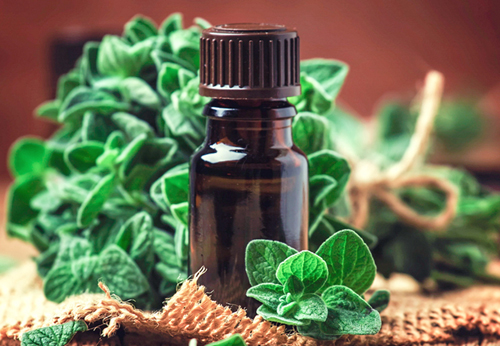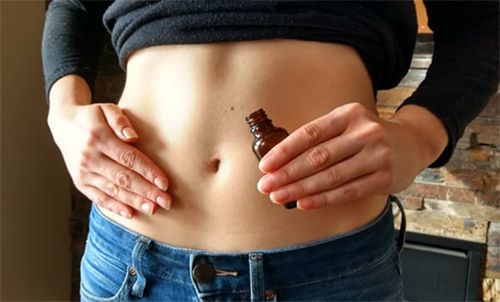Oregano oil benefits immune system and fights infection
Oregano (Origanum vulgare) is usually associated with Italian cooking, but it’s believed to have originated in Greece. It’s closely related to marjoram (Origanum majorana) and the two have often been confused.

A variety of oregano from Mexico (Lippia graveolens) was used for decades before being brought to America. It didn’t make an appearance in American cookbooks until after World War II. The herb that originates from the Mediterranean and from Mexico are slightly different.
The Mexican herb has a stronger flavor, while the Mediterranean leaf is smaller, lighter in color and has a milder flavor. When choosing which to include in your cooking, the Mexico variety works well with spicy flavors and the Mediterranean complements Italian and Greek dishes.
Origanum vulgare is a perennial plant that grows up to 3 feet high and 2 feet wide. It blooms between July and October with pinkish purple or white flowers. Oregano enjoys full sun and is a low-maintenance plant that attracts butterflies. It’s also resistant to drought and erosion.
The herb is rich in phenols, which are natural phytochemicals that have beneficial antioxidant effects. The two most abundant are thymol and carvacrol. Oregano has been used in traditional remedies as a relaxant, pain reliever and antibacterial agent. It also offers immune system support.
Oregano oil effective against norovirus
Around the world, norovirus triggers nearly 20% of all cases of gastroenteritis leading to diarrhea and vomiting. In the U.S. it’s the leading cause in people of all ages. Outbreaks usually happen from November to April; in years when there is a new strain, it can boost the numbers by 50%.
Symptoms of norovirus infection include nausea, vomiting, stomach pain and diarrhea. Some people may also experience fever, body aches and headache. Symptoms develop from 12 to 48 hours after being exposed and most people are well from one to three days after the symptoms appear.
Each year there are 900 people who die from norovirus, with 109,000 hospitalizations and up to 21 million cases. Many of the outbreaks occur in crowded locations such as nursing homes and schools. Despite the impact on health and the economy, no drugs are currently available for its prevention or treatment.
In addition to this, many aspects of the virus are not known since it is difficult to culture human norovirus and there is no small animal model. Noroviruses have been identified in mice, cattle and pigs and of these the murine norovirus found in mice replicates in cell culture and small animals. For this reason, it is the strain of norovirus studied in the lab.
Researchers have found that carvacrol, one of the primary components of oregano oil, is effective against murine norovirus. In one study, scientists used cell cultures and a side-by-side experiment with a cell binding assay and transmission electron microscopy.
Viral infectivity dropped within 15 minutes of exposure to both oregano oil and carvacol, but using carvacrol alone was far more effective. The researchers concluded carvacrol could: “… inactivate [murine norovirus] within 1 hour of exposure by acting directly on the viral capsid and subsequently the RNA. This study provides novel findings on the antiviral properties of oregano oil and carvacrol against MNV and demonstrates the potential of carvacrol as a natural food and surface (fomite) sanitizer to control human norovirus.”
Oregano oil and carvacrol are active against other bacterial agents found in the kitchen which can lead to food poisoning. In another study, researchers found that oregano essential oil could remove young and mature Staphylococcus aureus biofilms on stainless steel.
Oregano oil active against intestinal bacterial overgrowth
Small intestine bacterial overgrowth (SIBO) is the term used to describe an abnormal rise in overall bacterial population of the small intestine. It can happen when surgery, disease or medications slow the intestinal tract, which creates a breeding ground for bacteria. This can negatively impact immune health since your gut microbiome regulates your immune homeostasis.

Some of the health issues that can cause motility problems in the gastrointestinal tract include scleroderma, lupus and diabetes. The use of antispasm medications, the long-term use of proton pump inhibitors and the frequent use of antibiotics and narcotic medications all have been linked to SIBO.
Excess bacteria can cause weight loss, malnutrition and diarrhea. The primary treatment options used by Johns Hopkins Medicine are the antibiotic rifaximin (Xifaxan), and in some cases a combination of rifaximin and neomycin.
The condition has been studied in those who have disease affecting the intestines, such as irritable bowel syndrome (IBS). In one review of the literature, researchers identified 50 studies and found that more than 38% of people with IBS were positive for SIBO. The prevalence varied according to the type of test used for diagnosis and the risk rose for women, people of older age and those who had diarrhea with IBS.
In another study researchers gathered data from 104 people who tested positive for SIBO. Participants completed a study intervention and subsequent testing. They were offered a daily regimen of rifaximin or herbal therapy for 4 weeks. The researchers used a combination of herbs to provide broad coverage. Oil of oregano was one of those chosen because it’s well-documented that it “directly kills or strongly inhibits the growth of intestinal microbes. Oil of oregano has other beneficial properties such as inducing apoptosis in human colon cancer caco2 cells.”
At the end of the study, each person underwent a lactulose breath test (LBT) to check for the presence of SIBO. Of the patients who received herbal therapy, 46% had a negative follow-up compared to 34% of those using the rifaximin. There were 31.8% who did not respond to rifaximin and were offered herbal rescue therapy. Of those, 57.1% had a negative LBT after completing the treatment. The researchers concluded: “Herbal therapies are at least as effective as rifaximin for resolution of SIBO by LBT. Herbals also appear to be as effective as triple antibiotic therapy for SIBO rescue therapy for rifaximin non-responders. Further, prospective studies are needed to validate these findings and explore additional alternative therapies in patients with refractory SIBO.”
Oil may help reduce antibacterial resistance
Antibiotic resistance is a threat to human health. Infections caused by antibiotic resistant pathogens are sometimes impossible to treat. Health experts have been warning for decades that the overuse of antibiotics in humans and agriculture would usher in a potential explosion of death from pathogens that were once easily treated.
The Review on Antimicrobial Resistance was requested by the U.K. prime minister in 2014. The data suggested that drug resistant infections cause the loss of 50,000 lives each year in Europe and the U.S. Globally, that number is at least 700,000.
However, another estimate suggests the number in the U.S. is far higher, at about 162,000 each year. In addition, experts predict the global number may rise to 10 million people each year by 2050. This is 2 million more than are expected to die from cancer that year.
Essential oils, such as oregano oil, may help reduce antibiotic resistance. In one study, researchers evaluated the effectiveness of frankincense, lavender, lemon, thyme, oregano and myrtle essential oils against common pathogenic bacteria, including Pseudomonas aeruginosa, Escherichia coli, Enterococcus faecalis, Klebsiella pneumoniae and Staphylococcus aureus.
These bacteria are responsible for several types of infections including gastrointestinal and dermal ailments. The researchers used aqueous and micellar extracts to determine the minimal inhibitory concentration (MIC) and minimal bactericidal concentrations (MBC). The oils with the most activity against the bacteria were oregano oil, lemon, lavender and thyme.
Oregano oil had 64 times lower MICs and MBCs than ethylic alcohol. The bacteria that were most susceptible to it included methicillin resistant S. aureus (MRSA). Oregano and lavender aqueous extracts were active against K. Pneumoniae. The researchers concluded: “The present results may suggest some formulas of colloid or micelle suspensions of whole essential oils such as oregano, thyme or lemon oil, that may help in antimicrobial fight. Aqueous extracts of oregano or thyme oil with good antibacterial activity could also be used in selected cases.”
Take care when choosing your oregano oil
When purchasing oregano oil, take care to purchase from a trusted manufacturer because some sell adulterated oils. Some oil may be made from products which do not provide the same health benefits.
Oregano oil should be diluted in water or used with a carrier oil. The top choices are olive oil, coconut oil or jojoba. Test it on a small area of your skin when using it topically to be sure you don’t have a reaction. The pure oil can be a moderate skin irritant and it irritates your mucous membranes as well, which is why it must be diluted before use. Don’t use it on sores or cuts.
Clinical herbalist Michelle Lynde writes that the ideal ratio when diluting it for topical use is one part oregano oil to three parts carrier oil. A few drops of essential oil can also be added to a vaporizer or diffuser to help relieve the symptoms of allergies, sinusitis, chronic bronchitis and coughs.
However, diluted oil should be avoided in women who are pregnant or nursing, and it should not be given to babies or children. People who have high blood pressure or a heart condition should also avoid using oregano oil. When taken internally, the taste can be strong. The diluted oil can be mixed with juice or honey or added to pizza sauce.
yogaesoteric
February 23, 2021
